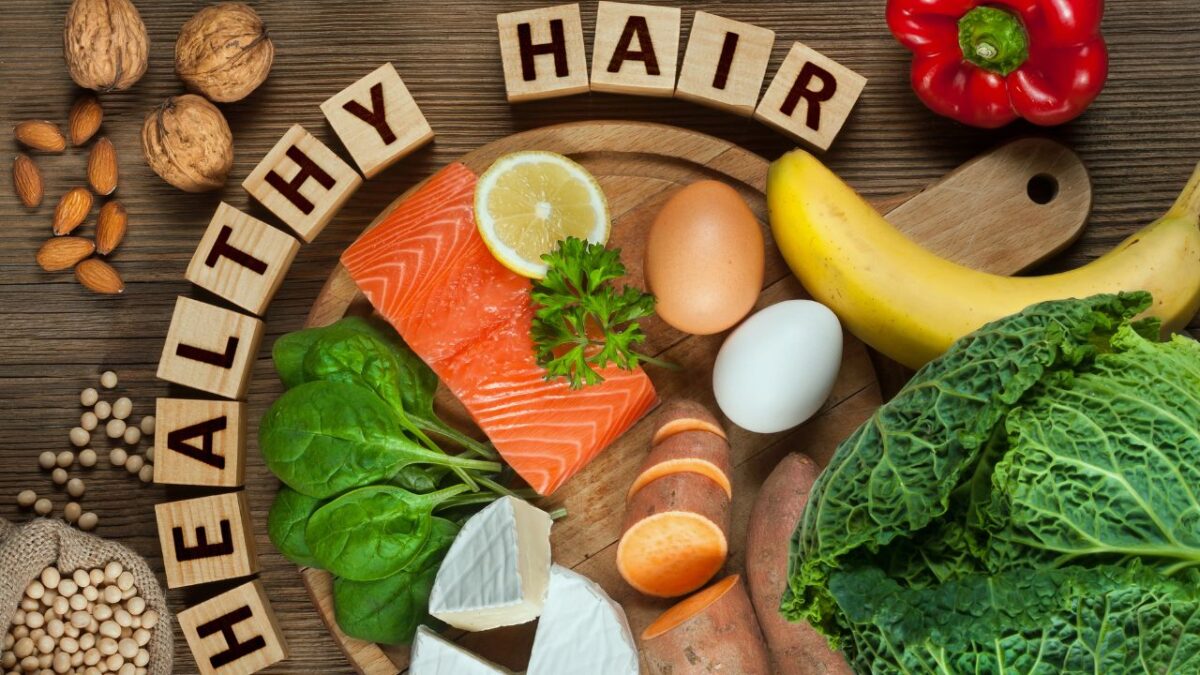5 Essential Nutrients to Combat Menopausal Hair Loss

Menopausal hair loss, while less discussed, stands as one of the most impactful symptoms women experience during menopause. As estrogen levels plummet, many women notice their once lustrous locks thinning, weakening, or falling out, leading to distress and a loss of self-esteem. However, the connection between nutrition and hair health offers a beacon of hope. In this blog, we share information about the specific role nutrients play in combating menopausal hair loss, illuminating a path forward for those seeking to reclaim their hair’s vitality.
The science of hair growth is intricate, influenced by genetics, hormonal balance, and nutritional status. During menopause, the decrease in estrogen and progesterone, alongside an increase in androgens, can disrupt the hair growth cycle, leading to hair thinning and loss. Yet, amidst this hormonal upheaval, nutrition emerges as a powerful tool. A targeted intake of essential nutrients can not only mitigate hair loss but also foster a conducive environment for hair regeneration and strength.
In the quest for hair health, five nutrients stand out as pillars. These nutrients collectively support various facets of hair health, from enhancing blood flow to the scalp and fostering new follicle growth, to reducing inflammation and strengthening the hair shaft. By understanding and incorporating these nutrients into the diet, women can begin a journey towards healthier, more resilient hair during menopause.
Let’s dive into the world of nutrition-based hair care solutions that promise to revitalize and strengthen your hair during menopause.
1. Iron
Iron plays a crucial role in hair health by supporting healthy blood flow to the scalp, which is vital for hair growth and strength. Iron deficiency can lead to hair loss, making it important for menopausal women to include iron-rich foods in their diets. It’s also beneficial to consume vitamin C-rich foods alongside iron-rich foods to enhance iron absorption.
- Recommended Intake: The recommended dietary allowance (RDA) for iron for postmenopausal women is about 8 mg per day. However, needs may vary, especially if a woman is iron deficient. It’s important to check with a healthcare provider before taking supplements, as excessive iron can be harmful.
- Sources: Lean meats, spinach, lentils, and fortified cereals.
2. Vitamin D
Vitamin D is linked to the production of new hair follicles and may help in creating a healthier scalp environment for hair to grow. Low levels of vitamin D have been associated with hair loss, making it essential to maintain adequate levels, especially during menopause.
- Recommended Intake: The RDA for vitamin D is 600 IU (15 mcg) per day for women up to age 70 and 800 IU (20 mcg) per day for women over 70. Some experts suggest higher intakes (1,000 to 2,000 IU per day) may be beneficial for overall health and to support hair health.
- Sources: Sun exposure, fatty fish, fortified foods, and supplements.
3. Omega-3 Fatty Acids
Omega-3 fatty acids are known for their anti-inflammatory properties, which can help counteract hair loss by improving scalp health and promoting hair growth. Incorporating foods rich in Omega-3 fatty acids into your diet can help improve hair density and diameter.
- Recommended Intake: There is no established RDA for omega-3s, but a general recommendation is to consume at least two servings of fatty fish per week, equivalent to about 250-500 mg of EPA and DHA per day.
- Sources: Fatty fish (salmon, mackerel), flaxseeds, chia seeds, and walnuts.
4. Zinc
Zinc is vital for hair tissue growth and repair and helps keep the oil glands around the follicles working properly. Zinc deficiency can lead to hair loss, which makes it crucial to ensure you’re getting enough of this nutrient.
- Recommended Intake: The RDA for zinc is 8 mg per day for women. Intake should not exceed 40 mg per day from all sources unless supervised by a healthcare professional, as high doses can lead to adverse effects.
- Sources: Beef, pumpkin seeds, lentils, and chickpea
5. Biotin (Vitamin B7)
Biotin is often touted for its hair health benefits, including improved hair growth and strength. It’s a part of the vitamin B complex and helps in the production of keratin, a protein that makes up hair. While biotin deficiency is rare, ensuring adequate intake can support hair health.
- Recommended Intake: The adequate intake (AI) for biotin is 30 mcg per day for adults. While biotin deficiency is rare, some may choose to take supplements to support hair health.
- Sources: Eggs, almonds, sweet potatoes, and avocados.
In addition to these nutrients, staying hydrated and maintaining a balanced diet rich in fruits, vegetables, lean proteins, and whole grains can support overall health and, by extension, hair health. If you’re experiencing significant hair loss during menopause, it’s also a good idea to consult with a healthcare provider to rule out other underlying conditions and discuss potential treatments.
